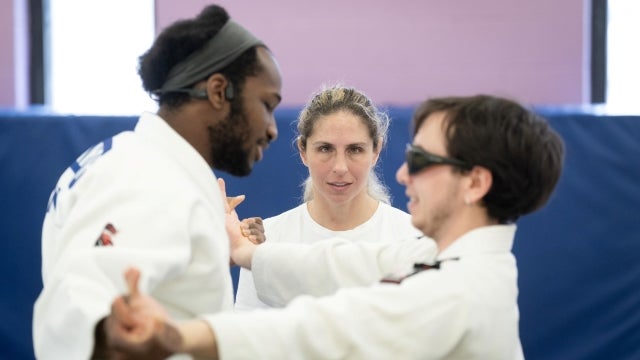Blind Judoka competes at 2024 Paralympics, leads self-defense workshops

Montrealers had one more reason to cheer for Paralympians this past summer, as local athlete and international champion Priscilla Gagné represented Canada in judo at the Paris 2024 Paralympic Games.
This was the third Paralympic Games for Gagné, a trailblazer in para sport, particularly in judo. She competed in the under-57 kg JI division visually impaired category and placed fifth.
In spite of having no central vision due to retinitis pigmentosa, Gagné has never let being blind stop her ambitions, finding freedom in sport.
Growing up in Sarnia, Ontario, Gagné credits her family for giving her space to experiment as central to becoming the athlete she is.
“My mom was always worried about me getting hurt, and I had to wear knee pads when I biked,” she laughed, “but that never stopped me.”
Her innately competitive personality and self-described “obsessive defiant disorder” has led her to rise to fifth in the world in the women’s 57-kg judo category.
Guided by Olympic and Paralympic coach, Andrzej Sadej, her career quickly accelerated. With her Paralympic debut at the 2016 Rio Games, she became the first Canadian woman to podium at the 2018 Para Judo World Championships. Gagné is a two-time Pan Am Games silver medalist and was Canada’s flag bearer for the 2020 Tokyo Paralympics.
This was the first Paralympic Games in which Canadian medallists would receive financial recognition on par with their Olympic counterparts (see article on p. 40 in our Spring 2024 edition).
In recent years, there has also been a shift in the classification and weight divisions, resulting in Gagné having to go up a category and compete against individuals with some vision. Out of principle against such changes, she opted to not participate in the 2023 Pan Am Games in Chile. “That completely goes backwards and undoes everything we’ve worked so hard to achieve,” she said.
When Gagné is not training, sparring or traveling with her guide dog Zophia, she gives motivational speeches and judo demonstrations. Most recently, she launched a series of self defense workshops with CNIB (formerly the Canadian National Institute for the Blind) for Montrealers who are blind or visually impaired.
The workshops are key for working on body posture and assertiveness, as well as how to respond to people who target them as victims or, alternatively, try to impose help. “In discussing [Priscilla’s] experience in combat sports and interest in helping people with vision loss, I was immediately interested in collaborating with her,” said David Trudel, director of psychosocial programming and community engagement. “[This was especially the case] with her personal and professional experience regarding the challenges encountered by people with visual impairments.”
Accessibility advocate Noah Silletta was one of the participants. Born with hypermobility as well as vision and mobility challenges exacerbated by a car accident, the workshops enabled Silletta to feel more confident in their current abilities. “It helps to be with people who understand your situation instead of having to always explain,” said Silletta.
In the 2024 Greatness Moves Us Paralympic video, Gagné advised families with blind children: “Let them get hurt, push them, encourage them – they need to know they are not fragile and figure out how to navigate that. That’s what makes an athlete an athlete, and a child into an adult.”









